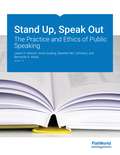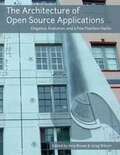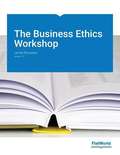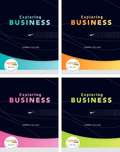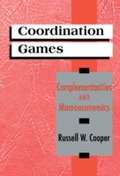Special Collections
Free Upskilling Books for All!
- Table View
- List View
Stand Up, Speak Out
by Jason S. Wrench and Anne Goding and Danette Ifert Johnson and Bernardo A. AttiasThe two key themes to Stand up, Speak out: The Practice and Ethics of Public Speaking make it a welcomed addition to the choices you have for a public speaking textbook. First it focuses on helping students become more seasoned and polished public speakers, and second, its emphasis on ethics in communication. It is this practical approach and integrated ethical coverage that sets Stand up, Speak out: The Practice and Ethics of Public Speaking apart from the other texts in this market.
General Chemistry
by Bruce Averill and Patricia EldredgeThe overall goal of the authors with General Chemistry: Principles, Patterns, and Applications was to produce a text that introduces the students to the relevance and excitement of chemistry. Although much of first-year chemistry is taught as a service course, Bruce and Patricia feel there is no reason that the intrinsic excitement and potential of chemistry cannot be the focal point of the text and the course. So, they emphasize the positive aspects of chemistry and its relationship to students' lives, which requires bringing in applications early and often. In addition, the authors feel that many first year chemistry students have an enthusiasm for biologically and medically relevant topics, so they use an integrated approach in their text that includes explicit discussions of biological and environmental applications of chemistry. Topics relevant to materials science are also introduced to meet the more specific needs of engineering students.
General Chemistry
by Bruce Averill and Patricia EldredgeThe overall goal of the authors with General Chemistry: Principles, Patterns, and Applications was to produce a text that introduces the students to the relevance and excitement of chemistry. Although much of first-year chemistry is taught as a service course, Bruce and Patricia feel there is no reason that the intrinsic excitement and potential of chemistry cannot be the focal point of the text and the course. So, they emphasize the positive aspects of chemistry and its relationship to students’ lives, which requires bringing in applications early and often. In addition, the authors feel that many first year chemistry students have an enthusiasm for biologically and medically relevant topics, so they use an integrated approach in their text that includes explicit discussions of biological and environmental applications of chemistry. Topics relevant to materials science are also introduced to meet the more specific needs of engineering students.
The Basics of General, Organic, and Biological Chemistry
by David W. Ball and John W. Hill and Rhonda J. J. ScottThe Basics of General, Organic, and Biological Chemistry by David W. Ball, John W. Hill, and Rhonda J. Scott is a new textbook offering for the one-semester GOB Chemistry course. The authors designed this book from the ground up to meet the needs of a one-semester course. It is 20 chapters in length and approximately 350-400 pages; just the right breadth and depth for instructors to teach and students to grasp. In addition, The Basics of General, Organic, and Biological Chemistry is written not by one chemist, but THREE chemistry professors with specific, complimentary research and teaching areas. David W. Ball's specialty is physical chemistry, John W. Hill's is organic chemistry, and finally, Rhonda J. Scott's background is in enzyme and peptide chemistry. These three authors have the expertise to identify and present only the most important material for students to learn in the GOB Chemistry course. These experienced authors have ensured their text has ample in-text examples, and "Test Yourself" questions following the examples so students can immediately check their comprehension. The end-of-chapter exercises will be paired, with one answered in the back of the text so homework can easily be assigned and self-checked.
Introductory Chemistry
by David W. BallDavid W. Ball of Cleveland State University brings his new survey of general chemistry text, Introductory Chemistry, to the market with a fresh theme that will be sure to hold student interest: "Chemistry is Everywhere." Introductory Chemistry is intended for a one-semester introductory or preparatory chemistry course.
Risk Management for Enterprises and Individuals
by Etti Baranoff and Patrick Lee Brockett and Yehuda KahaneThis book is intended for the Risk Management and Insurance course where Risk Management is emphasized. When we think of large risks, we often think in terms of natural hazards such as hurricanes, earthquakes or tornados. Perhaps man-made disasters come to mind such as the terrorist attacks in the U.S. on September 11, 2001. Typically we have overlooked financial crises, such as the credit crisis of 2008. However, these types of man-made disasters have the potential to devastate the global marketplace. Losses in multiple trillions of dollars and in much human suffering and insecurity are already being totaled, and the global financial markets are collapsing as never before seen. We can attribute the 2008 collapse to financially risky behavior of a magnitude never before experienced. The 2008 U.S. credit markets were a financial house of cards. A basic lack of risk management (and regulators' inattention or inability to control these overt failures) lay at the heart of the global credit crisis. This crisis started with lack of improperly underwritten mortgages and excessive debt. Companies depend on loans and lines of credit to conduct their routine business. If such credit lines dry up, production slows down and brings the global economy to the brink of deep recession or even depression. The snowballing effect of this failure to manage the risk associated with providing mortgage loans to unqualified home buyers have been profound, indeed. When the mortgages failed because of greater risk- taking on the Street, the entire house of cards collapsed. Probably no other risk-related event has had, and will continue to have, as profound an impact world wide as this risk management failure. How was risk in this situation so badly managed? What could firms and individuals have done to protect themselves? How can government measure such risks (beforehand) to regulate and control them? These and other questions come to mind when we contemplate the consequences of this risk management fiasco. Standard risk management practice would have identified sub-prime mortgages and their bundling into mortgage-backed-securities as high risk. People would have avoided these investments or would have put enough money into reserve to be able to withstand defaults. This did not happen. Accordingly, this book may represent one of the most critical topics of study that the student of the 21st century could ever undertake. Risk management will be a major focal point of business and societal decision making in the 21st century. A separate focused field of study, it draws on core knowledge bases from law, engineering, finance, economics, medicine, psychology, accounting, mathematics, statistics and other fields to create a holistic decision-making framework that is sustainable and value- enhancing. This is the subject of this book.
Social Problems
by Steven E. BarkanSocial Problems: Continuity and Change by Steve Barkan is a realistic but motivating look at the many issues that are facing our society today. As this book's subtitle, Continuity and Change, implies, social problems are persistent, but they have also improved in the past and can be improved in the present and future, provided that our nation has the wisdom and will to address them. It is easy for students to read a social problems textbook and come away feeling frustrated by the enormity of the many social problems facing us today. Social Problems: Continuity and Change certainly does not minimize the persistence of social problems, but neither does it overlook the possibilities for change offered by social research and by the activities of everyday citizens working to make a difference. Readers of Steve Barkan's book will find many examples of how social problems have been improved and of strategies that hold great potential for solving them today and in the future.
Organizational Behavior, V 2.0
by Talya Bauer and Berrin ErdoganIn writing Organizational Behavior, v.2.0, Talya Bauer and Berrin Erdogan, two leading researchers in management, had one simple aim: To bridge the gap between theory and practice of management with a distinct “experiential” approach.
WHAT’S NEW IN 2.0
UPDATED SECTIONS:
Updated to include many new case studies, statistics, data, figures, and graphics. Notably added are sections or new information on stress, communication and women in leadership. Toolboxes and related key terms are also updated in this new version.
Principles of Management
by Talya Bauer and Mason Carpenter and Berrin ErdoganPrinciples of Management by Carpenter, Bauer and Erdogan teaches management principles to tomorrow's business leaders by weaving three threads through every chapter: strategy, entrepreneurship and active leadership. Strategic: All business school teachings have some orientation toward performance and strategy and are concerned with making choices that lead to high performance. Principles of Management will frame performance using the notion of the triple bottom-line the idea that economic performance allows individuals and organizations to perform positively in social and environmental ways as well. The triple bottom line is financial, social, and environmental performance. It is important for all students to understand the interdependence of these three facets of organizational performance. The Entrepreneurial Manager: While the General Management course at Harvard Business School was historically one of its most popular and impactful courses (pioneered in the 1960s by Joe Bower), recent Harvard MBAs did not see themselves as general managers. This course was relabeled 'The Entrepreneurial Manager' in 2006, and has regained its title as one of the most popular courses. This reflects and underlying and growing trend that students, including the undergraduates this book targets, can see themselves as entrepreneurs and active change agents, but not just as managers. By starting fresh with an entrepreneurial/change management orientation, this text provides an exciting perspective on the art of management that students can relate to. At the same time, this perspective is as relevant to existing for-profit organizations (in the form intrapreneurship) as it is to not-for-profits and new entrepreneurial ventures. Active Leadership: Starting with the opening chapter, Principles of Management show students how leaders and leadership are essential to personal and organizational effectiveness and effective organizational change. Students are increasingly active as leaders at an early age, and are sometimes painfully aware of the leadership failings they see in public and private organizations. It is the leader and leadership that combine the principles of management (the artist's palette, tools, and techniques) to create the art of management. Cases: Mason provides brief cases in his Instructors Manual for those who take a case approach to the course or who wish to incorporate cases. This book's modular format easily maps to a POLC course organization (Planning, Organizing, Leading, and Controlling, attributed to Henri Fayol (1949, General and industrial management. London. Pitman Publishing company), and suits the needs of most undergraduate or graduate course in Principles of Management.
Principles of Management Version 2.0
by Talya Bauer and Mason Carpenter and Berrin Erdogan and Jeremy ShortPrinciples of Management has been thoroughly updated, and in this edition, you’ll find a new author, a new look and feel, new content, and new as well as updated end-of-the chapter cases. One reviewer of our revision said the following about the addition of our new pages and images: “I will tell you that the addition of pictures in this edition is brilliant! I compared this text to the previous one (page by page)... the pictures truly help bring the "black and white" pages to life!”
College Success
by Bruce Beiderwell and Linda Tse and Thomas J. Lochhaas and Nicholas B. DekanterCollege Success takes a fresh look at what it means, in today's world, with today's students, to be successful in college. Although many of the topics included--from study skills to personal health, from test-taking to managing time and money--will look familiar to those who have used student success texts that have been around for many editions, College Success takes a new approach. The focus is on realistic, practical tools for the students who need them. This is a book designed, frankly, for students who may have difficulty with traditional college texts. The style is direct and to the point. Information is presented concisely and as simply as possible. This is not a weighty tome that discusses student success--this is a manual for doing it. College student demographics have changed considerably in recent decades. More than a third of all students enroll not directly from high school but after a delay of some years. More students are working and have families. More students come from varied ethnic and cultural backgrounds. More students are the first in their family to attend college. More students have grown up with electronic media and now read and think in ways different from the previous generation. With these and so many other cultural changes, more students are not well prepared for a college education with the study skills and life skills they need to become successful students. For each student to get the most out of College Success and their college experience they must understand who they are as it relates to college. To that end, in every chapter students explore themselves, because success starts with recognizing your own strengths and weaknesses. Students make their own goals based on this self-assessment, determining what success in college really means for them as individuals. Interactive activities then help students learn the choices available to them and the possibilities for improving their skills. Skills are presented in step-by-step processes, tips for success in manageable highlighted displays. Most important, students always see the value of what they are reading--and how they can begin to apply it immediately in their own lives. College Success is intended for use in Freshmen Orientation, Study Skills or Student Success courses. A 2009 study revealed that currently nationwide, 34% of college freshmen do not return to their college for their sophomore year. This book is designed to help change that.
World Regional Geography
by Royal BergleeWorld Regional Geography: People, Places and Globalization is designed for students to experience and study as much of the world as possible within a limited amount of time. It gives students the fundamental concepts and the latest data regarding world places in a concise, easy-to-read format. This textbook focuses on the primary issues that have created our cultural and societal structures, and presents them within a framework for global understanding. A pattern of development is outlined from the imprint that European colonialism had on culture to the impact that giant retail corporations like Wal-Mart have on consumerism.
Principles of Sociological Inquiry
by Amy BlackstoneThe author of Principles of Sociological Inquiry: Qualitative and Quantitative Methods, Amy Blackstone, started envisioning this textbook while sitting in her own undergraduate sociology research methods class. She enjoyed the material but wondered about its relevance to her everyday life and future plans (the idea that one day she would be teaching such a class hadn't yet occurred to her).
Mastering Public Relations
by Shannon A. Bowen and Brad Rawlins and Thomas MartinThis book provides an executive review of the field of public relations with a focus on what managers need to know in order to master the function quickly and effectively. Throughout the text, we integrate the academic with the professional by asking, how can an executive use this knowledge to make the most of the public relations function, department, and initiatives in order to help their whole organization be successful? , , , and of the book provide the busy manager with the taxonomy of the public relations field, provide research on the theory of public relations, and examine the structure of organizations and where public relations fits within that structure. , , , and examine how public relations should be conducted in order to achieve maximum results and provide a comprehensive review of public relations strategy, including how to conduct a public relations campaign. , , , and discuss the organizational settings most common in public relations: corporate, agency, government, or public affairs and nonprofit or advocacy groups and the public relations approaches common in each. We review what research finds regarding the most excellent ways to manage public relations and the best ways to analyze and address the ethical challenges to be faced in public relations. We occasionally use short case examples to illustrate and apply the main points managers will need to know in order to manage public relations effectively. Throughout this book, we focus on the managerial pursuits in public relations, such as strategic relationship maintenance, segmentation of publics, and conducting research. We offer insight into the managerial activities of issues management, lobbying and advocacy, creating stakeholder relationships, reputation management, ethical counsel, and corporate communication. We examine the most current thought in public relations to help the busy manager master the most important concepts in the field quickly, accessibly, and with an eye toward helping an organization or client achieve the most effective results through cutting-edge, modern, research-based strategic public relations management.
The Architecture of Open Source Applications
by Greg Wilson and Amy BrownArchitects look at thousands of buildings during their training, and study critiques of those buildings written by masters. In contrast, most software developers only ever get to know a handful of large programs well—usually programs they wrote themselves—and never study the great programs of history. As a result, they repeat one another's mistakes rather than building on one another's successes. Our goal is to change that. In these two books, the authors of four dozen open source applications explain how their software is structured, and why. What are each program's major components? How do they interact? And what did their builders learn during their development? In answering these questions, the contributors to these books provide unique insights into how they think. If you are a junior developer, and want to learn how your more experienced colleagues think, these books are the place to start. If you are an intermediate or senior developer, and want to see how your peers have solved hard design problems, these books can help you too.
The Business Ethics Workshop v 1.0
by James BrusseauOn a good day in the business ethics classroom discussion charges forward; students have read the assigned case study, they're engaged by the conflict and want to work through it. Then, there's a bad day: students didn't bother to do the reading and the hour sags listlessly. The key to going the first way is case studies that students want to read, and The Business Ethics Workshop by James Brusseau provides them with reality and engagement. Reality: No stilted and contrived stories about Steve Smith and Jane Jones. Excerpts from blogs and newspapers bring the weight--and provocation--of the world as it's actually happening to the classroom.
Small Business Management in the 21st Century
by David T. Cadden and Sandra L. LuederSmall Business Management in the 21st Century offers a unique perspective and set of capabilities for instructors. The authors designed this book with a "less can be more" approach, and by treating small business management as a practical human activity rather than as an abstract theoretical concept. The text has a format and structure that will be familiar to you if you use other books on small business management. Yet it brings a fresh perspective by incorporating three distinctive and unique themes and an important new feature (Disaster Watch) which is embedded throughout the entire text. These themes assure that students see the material in an integrated context rather than a stream of separate and distinct topics. First, the authors incorporate the use of technology and e-business as a way to gain competitive advantage over larger rivals. Technology is omnipresent in today's business world. Small business must use it to its advantage. We provide practical discussions and examples of how a small business can use these technologies without having extensive expertise or expenditures.
Essentials of Geographic Information Systems
by Jonathan Campbell and Michael ShinEssentials of Geographic Information Systems integrates key concepts behind the technology with practical concerns and real-world applications. Recognizing that many potential GIS users are non-specialists or may only need a few maps, this book is designed to be accessible, pragmatic and concise. Essentials of Geographic Information Systems also illustrates how GIS is used to ask questions, inform choices and guide policy. From the melting of the polar ice caps to privacy issues associated with mapping, this book provides a gentle, yet substantive, introduction to the use and application of digital maps, mapping and GIS.
International Business
by Mason A. Carpenter and Sanjyot P. DunungInternational Business is one of the most challenging and exciting courses to teach in the Business School. To teach a current, dynamic and complete course you need a textbook by authors as passionate and informed about International Business as you are. Carpenter and Dunung's International Business: The Opportunities and Challenges of a Flat World provides exploration into building, leading, and thriving in global organizations in an increasingly flat world. The authors define "Flat world" as one where (1) service industries that dwarf manufacturing industries in terms of scale and scope, (2) an Internet that pervades life and work, and (3) networks define modern businesses, whether service or manufacturing. Carpenter and Dunung's text is designed to speak to technologically-savvy students who see national borders as bridges and not barriers. The authors use the lexicon of international business, and additionally, develop students' knowledge of international contexts with the aim that they may launch, run, and work in any organization that is global in scope (or is wrestling with global competition or other global threats).
Six Steps to Job Search Success
by Caroline Ceniza-Levine and Connie Thanasoulis-CerrachioThis book is a practical discussion of actionable steps (six of them!) that students can take to land a job regardless of the market. Whether the estimate is 25% unemployment or single-digit unemployment, that number doesn't apply to any one student. For any individual, the unemployment rate is 0% or 100%. One either has a job or doesn't. When any one person is looking for a job and there is 10% unemployment, that person just wants to be one of the nine people that has a job. Students might think even that one job is beyond their grasp. They think they don't have the right degree. Their school is in a different location than where they'd like to work. Not enough jobs are listed or employers are visiting the campus. This type of thinking cedes control of a student's search to outside forces. It is not up to professors, schools, career services support, or recruiters to get students a job. This book is about the proactive things that students can do to get themselves a job.
Exploring Business
by Karen CollinsCollins is the only Introduction to Business book to teach students the topics of business through an in-depth study of a single company--Nike. How do you show your students the relationships between what they are learning in the classroom and what happens in the real business world? What happens when your students don't see the connections between the theory they are learning in the classroom and what is happening in the real business world?
American Government and Politics in the Information Age
by David L. Paletz and Diana Owen and Timothy E. CookAmerican Government and Politics in the Information Age by Paletz, Owen, and Cook, is a comprehensive introduction to the vital subject of American government and politics. It is a comprehensive introduction to American politics and government; it covers all the basics. The text: * introduces the intricacies of the Constitution, the complexities of federalism, the meanings of civil liberties, and the conflicts over civil rights; * explains how people are socialized to politics, acquire and express opinions, and participate in political life; * describes interest groups, political parties, and elections--the intermediaries that link people to government and politics; * details the branches of government and how they operate; * shows how policies are made and affect people's lives.
Macroeconomics
by Russell Cooper and A. Andrew JohnThis book studies the implications of macroeconomic complementarities for aggregate behavior. The presentation is intended to introduce Ph. D. students into this sub-field of macroeconomics and to serve as a reference for more advanced scholars. The initial sections of the book cover the basic framework of complementarities and provide a discussion of the experimental evidence on the outcome of coordination games. The subsequent sections of the book investigate applications of these ideas for macroeconomics. The topics Professor Cooper explores include: economies with production complementarities, search models, imperfectly competitive product markets, models of timing and delay and the role of government in resolving and creating coordination problems.
Microeconomics
by Russell Cooper and A. Andrew JohnThis textbook, Microeconomics: Theory Through Applications, centers around student needs and expectations through two premises: ... Students are motivated to study economics if they see that it relates to their own lives. ... Students learn best from an inductive approach, in which they are first confronted with a problem, and then led through the process of solving that problem. Many books claim to present economics in a way that is digestible for students; Russell and Andrew have truly created one from scratch. This textbook will assist you in increasing students' economic literacy both by developing their aptitude for economic thinking and by presenting key insights about economics that every educated individual should know.
Writing about Literature through Theory
by John Pennington and Ryan CordellWriting about Literature through Theory by Pennington and Cordell is the first introduction to literature text to embrace both the best of print culture and the opportunities of the digital age, while being grounded in the rhetoric and composition field pertaining to the developmental writing process. It is also unique because it uses literary theory as the foundation for students’ development as critical thinkers and writers. Following Gerald Graff’s ideas in “Disliking Books at an Early Age,” Writing about Literature through Theory uses theoretical approaches to open literary texts up to students across the disciplines. Writing about Literature through Theory focuses on writing as a process, and each chapter includes the following:
